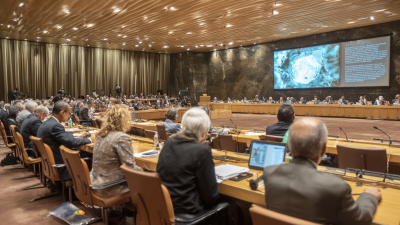In an era marked by escalating environmental challenges, the role of the United Nations Environment Programme (UNEP) is more crucial than ever. Established in 1972, UNEP serves as the leading global environmental authority, championing sustainability initiatives across nations. According to the United Nations' Global Environment Outlook report, approximately 75% of the Earth's land surface has been significantly altered, leading to a dire need for concerted action to mitigate environmental degradation. Furthermore, the Intergovernmental Panel on Climate Change (IPCC) highlights that urgent measures are required to limit global warming to 1.5 degrees Celsius, underscoring the importance of UNEP's endeavors in promoting sustainable practices. As a facilitator of international cooperation and a provider of scientific assessments, the UNEP not only guides policymaking but also empowers communities to foster a sustainable future. This blog delves into the multifaceted role of UNEP in steering global sustainability efforts.

 The United Nations Environment Programme (UNEP) plays a crucial role in promoting global sustainability through various strategic initiatives. One of its key objectives is to encourage the integration of environmental considerations into national policies and actions. By providing guidelines and support, UNEP assists countries in developing sustainable practices that resonate with both local and global environmental goals. This leads to better management of resources and a significant reduction in pollution levels.
The United Nations Environment Programme (UNEP) plays a crucial role in promoting global sustainability through various strategic initiatives. One of its key objectives is to encourage the integration of environmental considerations into national policies and actions. By providing guidelines and support, UNEP assists countries in developing sustainable practices that resonate with both local and global environmental goals. This leads to better management of resources and a significant reduction in pollution levels.
To maximize efforts in sustainability, UNEP focuses on education and awareness, enabling communities to understand their environmental impact. Advocacy for green technologies and renewable energy sources helps nations transition towards sustainable development. A useful tip for individuals is to actively engage in local sustainability programs and share eco-friendly practices within their communities.
Another significant initiative is UNEP’s commitment to combating climate change by facilitating international dialogues and partnerships. This encourages nations to set ambitious targets for reducing greenhouse gas emissions. To further support these efforts, individuals can advocate for policy changes by participating in environmental campaigns and supporting legislation that prioritizes ecological well-being. This grassroots involvement is essential for driving meaningful change on a global scale.
The United Nations Environment Programme (UNEP) plays a crucial role in spearheading global sustainability efforts, particularly in climate change mitigation and adaptation. One of UNEP's key interventions is the promotion of the Climate Change Emissions Gap Report, which highlights that to limit global warming to 1.5°C, we need to reduce greenhouse gas emissions by 55% by 2030 compared to 2010 levels. This report serves as a pivotal resource for governments and organizations to guide their climate action strategies.
Additionally, UNEP has been instrumental in launching the Adaptation Gap Report, which indicates that developing countries may require up to $300 billion per year by 2030 to implement necessary adaptation measures. This underscores the urgency of financial support and innovative solutions to tackle climate impacts, especially in vulnerable regions. UNEP actively collaborates with various stakeholders to enhance capacity-building and technology transfer, which are essential for effective climate adaptation.
**Tips:** When considering sustainable practices, aim for energy efficiency in your daily life. Simple actions like using energy-efficient appliances can significantly contribute to reducing overall emissions. Furthermore, stay informed about local initiatives and programs that support climate resilience—your participation can make a substantial difference in your community.
The United Nations Environment Programme (UNEP) plays a pivotal role in advocating for the Sustainable Development Goals (SDGs) established by the UN. As the leading global environmental authority, UNEP fosters international cooperation to create policies that promote sustainable practices. By facilitating dialogue among nations, UNEP helps to identify environmental challenges and implement strategies that align with the SDGs, particularly those focused on responsible consumption and production, climate action, and life on land and underwater.
One of UNEP's key functions is to provide a scientific foundation for the SDGs through research and data collection. This supports member states in making informed decisions about sustainability initiatives. Additionally, UNEP conducts awareness campaigns to educate communities about the importance of achieving the SDGs. Through projects that target climate resilience and biodiversity conservation, UNEP empowers local actors to implement sustainable practices, ensuring that economic growth does not come at the expense of the environment. By integrating environmental considerations into development plans, UNEP is instrumental in steering the global community toward a more sustainable future.
The United Nations Environment Programme (UNEP) plays a critical role in promoting global sustainability by addressing issues related to biodiversity and ecosystem services. One of its key impacts is the development and implementation of frameworks that guide nations in conserving natural habitats and species. Through initiatives such as the Biodiversity and Ecosystem Services Programme, UNEP works to ensure that diverse ecosystems remain resilient and that the services they provide—such as clean air, water, and food—are sustained for future generations.
Tips for fostering biodiversity in your local environment include planting native flora, which supports local wildlife and helps maintain ecological balance. Additionally, community-driven conservation projects can substantially enhance the effectiveness of UNEP's initiatives at a grassroots level. Encouraging local participation in monitoring ecosystem health not only raises awareness but also empowers communities to take ownership of their environmental stewardship.
Another vital aspect of UNEP’s work is its role in facilitating international cooperation on environmental issues. By bridging gaps between countries, UNEP helps to create policies that protect endangered species and their habitats across borders. Individuals can contribute by advocating for sustainable practices within their networks, promoting responsible consumption, and supporting conservation organizations that align with UNEP’s mission to safeguard the planet’s rich biodiversity.
| Dimension | Description | Impact | Geographical Scope | Sustainability Goal |
|---|---|---|---|---|
| Biodiversity Conservation | Promotes the protection of various species and their habitats. | Helps maintain ecosystem balance and supports livelihoods. | Global | Goal 15: Life on Land |
| Ecosystem Services | Facilitates recognition of the benefits ecosystems provide. | Enhances human well-being and economic development. | Regional | Goal 6: Clean Water and Sanitation |
| Climate Action | Guides countries in adopting strategies for climate resilience. | Reduces vulnerability and promotes socio-economic stability. | Global | Goal 13: Climate Action |
| Sustainable Development Goals (SDGs) | Integrates environmental considerations across all goals. | Encourages a holistic approach to sustainability. | Global | All SDGs |
| Capacity Building | Provides training and resources for environmental management. | Empowers local communities and enhances governance. | Local and National | Goal 17: Partnerships for the Goals |
 The United Nations Environment Programme (UNEP) plays a vital role in promoting global sustainability through its collaborative approach to environmental governance. By fostering partnerships with governments, civil society, and the private sector, UNEP ensures that diverse perspectives and resources are integrated into global environmental strategies. This collaborative effort not only enhances the effectiveness of environmental policies but also accelerates the implementation of sustainable practices across various sectors.
The United Nations Environment Programme (UNEP) plays a vital role in promoting global sustainability through its collaborative approach to environmental governance. By fostering partnerships with governments, civil society, and the private sector, UNEP ensures that diverse perspectives and resources are integrated into global environmental strategies. This collaborative effort not only enhances the effectiveness of environmental policies but also accelerates the implementation of sustainable practices across various sectors.
One key aspect of UNEP’s approach is its focus on building strong networks among stakeholders. By facilitating dialogues and knowledge sharing, UNEP helps to create synergies that amplify the impact of environmental initiatives. Partnerships, such as those with the Global Environment Facility and various NGOs, enable UNEP to leverage funding and expertise, driving forward critical projects that address pressing environmental challenges.
Tip: To enhance sustainability efforts in your local community, consider engaging with local UNEP initiatives or similar organizations. Their resources can help you connect with like-minded individuals and gain access to tools you may need in your sustainability journey.
Tip: Always seek partnerships that align with your environmental goals. Collaborating with other organizations can not only expand your reach but also enrich your understanding of sustainable practices, leading to more impactful outcomes.






